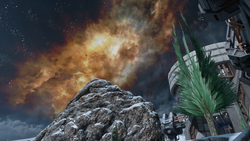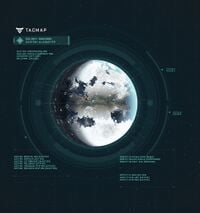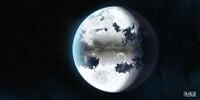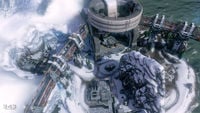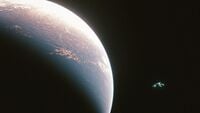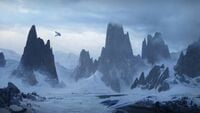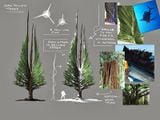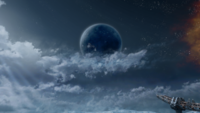Concord
From Halopedia, the Halo wiki
| Concord | |
|---|---|
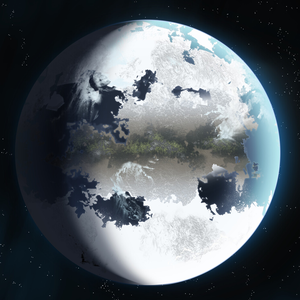
| |
| Astrographical | |
|
System: |
|
|
Orbiting: |
|
|
Moon(s): |
|
| Societal | |
|
Demonym: |
|
|
Species: |
|
|
Colonized: |
|
|
Government: |
|
Concord is a planet in the Alabaster system and a human Outer Colony, under the authority of the Unified Earth Government.[1]
Overview[edit]
Astronomical features[edit]
Concord is located in close proximity to what appears to be an emission nebula, which is close enough to the planet to be visible to the naked eye in the northern hemisphere, dominating a large portion of the sky and giving off a distinct orange glow. The largest of its two moons exhibits some form of megascale engineering.[5]
Environmental features[edit]
Concord's polar caps dominate the northern and southern hemispheres of the planet, though the equatorial habitable band is relatively mild and pleasant. However, the hinterlands remain hostile and sparsely populated, beyond miners and hardy isolationists.[1] This equatorial band has alpine forests and experiences seasonal changes with winter and summer months.[4]
Ecology[edit]
Concord's northern polar region is home to at least three types of flora: small shrubs visually identical to sage and juniper, and a species of tree that exhibits a trifurcated growth structure, with three photosynthetic sail-like fins emerging from a central trunk composed of sinewy, corded fibers, similar to Earth banyan trees but without a branching aerial root structure. Their height can exceed 34 m.[5]
Locations[edit]
- Caravelle province
- Corsica
- Bristol Bay
- Bristol Sea
- Longbow Station
- Recurve Station
- Kelowna
- Hinterlands region
History[edit]
Colonization[edit]
Originally categorized as a marginal prospect for colonization, Concord was situated at the prime confluence of multiple slipspace routes. Furthermore, extensive mineral wealth on Concord's surface was of interest to Lethbridge Industrial and settlement co-ops based out of the Sol system's Jovian colonies. Thus, in 2490, Concord was settled by the Unified Earth Government as an Outer Colony.[1]
Prior to 2525, the station's mass drivers were used to launch deep space monitoring relays in order to study distant star systems; one such facility was known as Longbow Station.[6]
Human-Covenant War[edit]
During the Human-Covenant War, Concord saw a population surge and investment as refugees from evacuated colonies settled on the planet. Within a few decades, outposts were transformed into cities and Lethbridge Industrial rose to become a first-tier megacorporation.[1]
As the war began to get increasingly dire, the UEG invested heavily in the infrastructure of the planet. With refugees being settled in the various cities of the planet, a number of the original settlers moved out into the harsher wilderness of the world.[4]
The planet was attacked by the Covenant in December 2551,[7][3] and ultimately successfully defended.[4] Despite the attack, Lethbridge Industrial established themselves in the megacity of Lethbridge, Corsica and continued to invest heavily in the planet's infrastructure and development.[1][8]
Post-war[edit]
The Concord Incident took place in 2554, during which Spartan-IV operatives made use of outer-plated leg protections.[9]
In 2558, Concord's UNSC supply routes were disrupted by a faction of Kig-Yar pirates. In response, the Office of Naval Intelligence charged Spartan Kojo Agu with neutralizing the pirates while testing a prototype of the DEADEYE-class Mjolnir armor system. After a four-day operation, Agu succeeded in eliminating the pirates.[10]
At some point prior to December 2559, Concord was interdicted by Guardians.[11]
Government and society[edit]
Defenses[edit]
During the planetary invasion of 2551, Concordian citizens formed their own militia force.[4][3] The planet's civilian industrial mass driver facilities such as Longbow and Recurve stations were capable of limited use as anti-orbital artillery, alongside serving to house and launch detection equipment into space used to track the movement of Covenant fleets.[4][12]
Gallery[edit]
A Banshee flies over some of Concord's terrain.
List of appearances[edit]
- Halo 4 (First appearance)
- Halo: New Blood (Mentioned only)
- Halo Infinite (Mentioned only)
- Halo: Winter Contention
Sources[edit]
- ^ Jump up to: a b c d e f g h i j k Halo Encyclopedia (2022 edition), page 44
- ^ This image of Longbow Station, Concord
- ^ Jump up to: a b c Halo Waypoint, Halo Infinite - Lone Wolves Intel (Retrieved on Nov 3, 2022) [local archive] [external archive]
- ^ Jump up to: a b c d e f Halo: Winter Contention
- ^ Jump up to: a b Halo 4, multiplayer map Longbow
- ^ Halo 4 Official Site: MAPS + MISSIONS
- ^ Halo 4, Venator Armor description
- ^ Halo 4 Interactive Guide
- ^ Halo 4: Outer-plated legs description
- ^ Halo Waypoint, Canon Fodder - Lore of the Rings
- ^ Halo Infinite: MK12T2 CBRN/TRAILWATCH description
- ^ Halo 4: The Essential Visual Guide, page 209

